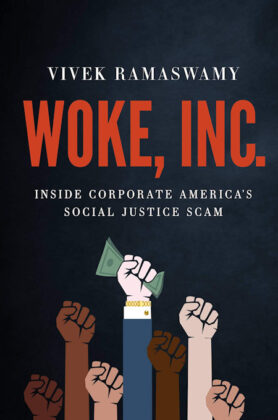Chris Bray on Vivek Ramaswamy’s book Woke, Inc.:
Vivek Ramaswamy was trying to close a deal, so he went to do some relationship building over dinner at an investor’s house. As dinner ended, the investor’s son came downstairs to greet the visitors, and he turned out to be a high school senior who was applying to Harvard. By the most remarkable coincidence, Vivek Ramaswamy is a Harvard grad, so the kid asked for some advice on getting in. Stand out, the Harvard grad told the Harvard applicant. Have something that makes you different than all the other applicants. Oh, the kid said, yeah — I got that. It turns out the seventeen year-old son of a venture capitalist had started a non-profit to fight against global sex slavery, which did indeed impress the admissions office and did indeed get him into Harvard. When Ramaswamy ran into the kid again, a few years later, he was shopping for Wall Street internships — and had moved on from the whole sex slavery thing, which had by then served its purpose.
Ramaswamy’s book Woke, Inc., a title published last year that seems to be gaining new momentum now as its author takes on corporate ESG posturing, accurately promises to take readers “inside corporate America’s social justice scam”, though I don’t love everything he offers as a solution. He clearly is reporting from inside: He’s a Harvard grad, a Yale Law grad, a former hedge fund employee, and a former pharmaceutical CEO. (Those credentials make you trust his argument, right?)
The thing the kid did, dummying up a quick thing to fight global sex slavery to get it into his admissions package, is a version of a maneuver that Ramaswamy finds all over the woke corporate world. The highly woke consumer products company Unilever is passionate about taking deep notice of intersectionality and serving women of color, and it partners with UN Women, “a nonprofit branch of the UN dedicated to advancing gender equality and empowering women”. Also, dozens of women who work on a Unilever tea plantation in Kenya were gang-raped in front of their families, an event that was coupled with a dozen or so murders, and Unilever declined to provide them with substantial support or assistance: “Unilever said the attacks on its plantation were unexpected and therefore that it should not be held liable”.
Unilever provides money to UN Women, Ramaswamy concludes, and UN Women provides Unilever with “moral cover for the Kenyan massacre”. Woke Unilever is a façade for, you know, Unilever. It’s a strategy, one example of many, and Ramaswamy argues that the “arranged marriage” between wokeness and corporate capitalism was born out of Occupy Wall Street: Here’s a check, now let’s stop talking about TARP and start talking about white privilege.
You should read Woke, Inc., so I won’t go on summarizing. But without going deeper into Ramaswamy’s argument, which reflects a series of increasingly familiar observations about social class and the function of wokeness, the point is the inauthenticity and shallowness of corporate social justice posturing, all of which is meant to protect the core of the project — to provide cover for business practices that might otherwise be criticized. It’s a show, a performative and manipulative posture. You could easily make comparable arguments about wokeness and power in academia, media, or government.
Now, to take all of this and pivot to an argument that will satisfy absolutely no one, if the social justice façade is a façade — shallow, performative, calculatedly purpose-serving — then there’s a good chance the branch managers of the globalist project will drop it when it slides out of fashion. The kid who, wanting a career on Wall Street, did the sex slavery nonprofit thing just long enough to get into Harvard: That kid is a middle manager now, and he’ll recite slogans about white privilege or not, as Current Thing demands, as long as the checks still cash. We’ve credentialed people for membership in a series of high-cultural-status groups on the basis of their ability to chant slogans and perform rituals; they are coreless.




